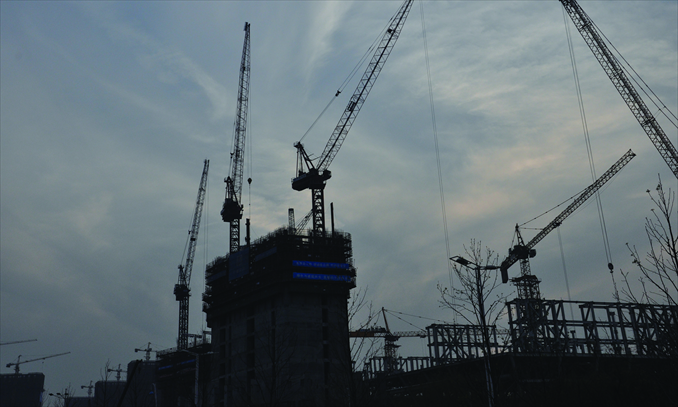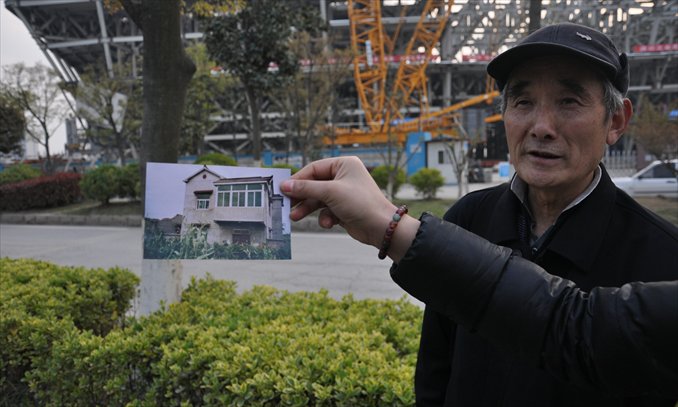Nanjing covers rubble with glamor


The storied city of Nanjing seems to be trying very hard to set aside its dark past and impress the world with its booming image as an Olympic city.
Entering the Nanjing subway, you can see the influence of the Olympic Games everywhere as lines wind out into the suburbs, new districts are connected to the grid and skyscrapers reach toward the clouds as the Games draw closer.
Walking along the streets of newly developed areas in Jianye district, it's hard to imagine that there were once villages and streams scattered around here less than a decade ago. Slogans and banners proclaiming "Share the Games, Share our dreams" meet the eyes of locals and travelers alike, promising a more convenient Nanjing and a greener city to live in.
The Nanjing Youth Olympic Games, scheduled to open in August 2014, will have three major areas bearing 34 venues. All the renovated venues will be ready by the end of 2013 and newly built or temporary ones will be done by April 2014, according to the official website of the Games.
Since Nanjing won its bid to host the Games in 2010, the whole city has been in constant renovation and construction mode.
"It's the changes of infrastructure that are the most obvious in urbanization. China's speed of urbanization is fast, and hosting a large event like the Olympic Games makes the progress even faster. Nanjing is taking every opportunity from the event to make its name," Yao Yongling, a professor at School of Public Administration of Renmin University of China, told the Global Times.
Beijing made similar efforts during the 2008 Olympic Games, trying to ensure cleaner air, less traffic jams and a record speed to meet infrastructure construction targets.
But media reports have said time and again that the Olympic syndrome brings inconvenience and forced demolition to some citizens.
Nanjing is trying to catch up with Beijing. But has it really learned lessons from the capital's experiences or it is too busy meeting the interests of a precious few, while masquerading as working for the greater good?
Is no change better?
Putting up pictures of their old houses at construction sites in the Jianye district of Nanjing, Teng Xueqin and her father Teng Xiaoming couldn't help but tell others about the cozy lives they led seven years ago.
Teng Xiaoming, 65, used to live in a three-story, 300-square-meter house he built and designed himself. His son and daughter lived side by side with him as his grandchildren ran around and played in the small garden outside.
But now, the old path that Teng's family lived near is a four-lane road called Yanshan. Areas along Yanshan road are now thriving residential zones which the Nanjing land and resources department opened bidding on in 2012.
Construction plans show that what will become part of the Nanjing Youth Olympic Conference Center is only five minutes walk from where Teng's former houses once stood.
Villagers who once lived in the areas eyed up by urban planners as the center of Nanjing's future development plans were not entirely down on their luck, however. The compensation offered to them allowed them to buy a number of apartments each in the city, making them rich as the city's property prices soared with the Games approaching.
But Teng and his neighbors were not so lucky and were somehow seen as obstacles to the vision of a new Nanjing. They were told in a letter from Nanjing Hexi State Assets Group, belonging to the city government, in June 2003 that their houses and land would be appropriated.
Teng asked for 60 million yuan ($9.7 million) in compensation for the three houses he owned. He said he passed this request on to the land bidding price at the time. However, the district government denied his requests and promised to compensate him with other housing and a sum in the tens of thousands of yuan.
Their houses were demolished in September 2005 under court orders from Nanjing Intermediate People's Court and Jiangsu Provincial People's Higher Court. Teng was told this was necessary for the greater good of the preparations for the Nanjing Games.
The Global Times made numerous attempts to reach local authorities in Nanjing, including the land and resources department, as well as the Nanjing Youth Games organizing committee. Most of these attempts proved unsuccessful and when reached by phone, government staff sought to pass the buck on to another department or claimed to have no authority to speak on the matter.
After failing to reach an agreement with local government, Teng Xiaoming and Teng Xueqin started to petition in both Nanjing and Beijing. But they were denounced as disturbing social order and were sent to a labor reeducation center in Nanjing in 2009 and were kept there a year.
Li Peili, a 50-year-old man from the same village as Teng, has lived in a brick shed with his wife near a construction site since their house was demolished.
"The district government tore down our house but didn't give me any compensation because they said they didn't have money at the time. My house was not included in the Games center zones, but it was destroyed anyway," Li told the Global Times.
"This is the second shack I have built since my old house was demolished. One day when I went out with some friends, my first shack was completely destroyed after we returned. But I have nowhere to go now and I have to stick to this place," Li added.
Movement sickness
Teng and Li suffered from side effects of an overly rapid urbanization process done without pausing to consider the needs of locals.
"During rapid urbanization, the appearance of the city is refreshing but on the other side, the upgrading infrastructure can't keep up with social welfare and other fields. The big cities have caught the over-expansion bug," said.
Vox-pops on the streets of Nanjing show that citizens are irritated by continuous construction which has worsened air quality, among other grievances.
With the Beijing Olympics in 2008 and the Shanghai Expo two years later, China is no stranger to holding large-scale international events. But however much the country broke records again and again in terms of construction times or opening ceremonies, the dark business of demolition behind the pizzazz has never been far off.
A courtroom was opened in the 2008 Beijing Olympic Village area in June 2007 to deal with civil cases in the northern part of the city where games were held, and authorities pledged to scrutinize cases especially those linked to demolition, Xinhua reported.
"There are so many lessons that could be drawn from Beijing's experience. At the time of preparing for those large events, it is hard for officials to realize that they should balance expansion speed with protecting the unique features of their city," Yao said.
Forced demolitions and occupying too much land with excessive investment are destroying the natural speed of urbanization and causing a hidden crisis for social harmony, Yao added.
Local judicial departments in Nanjing also pledged to make sure that no such abuses or corruption would be made during infrastructure construction for the Nanjing Games.
The Nanjing 2014 Organizing Committee promised corruption-free Games and ensured all the process and bidding would be carefully supervised by the public.
The Nanjing government pledged to protect the old town center by increasing its forest coverage and ensuring better air quality. Also, a comprehensive transportation network to link bus, airport, high-speed railways and ports will also be established.
It seems that in light of revelations made by people like the Teng family, these pledges have fallen some way short of the mark.
Willfully unlawful
Jianye district is one of the key areas experiencing illegal demolitions. The district prosecutor said it had processed five cases of illegal land appropriation since 2008 which not only tarnished the government's image but also led to petitions and mass protests.
However, forced demolitions have been a vicious circle since long before the Olympic Games bid, ever since local governments realized the amount of economic and political gain they could acquire through such speculation.
This leaves legal experts highly concerned that the coming Games haven't played any positive role in making the legal system function any better.
Teng and Li's families have continuously turned to the courts and petition offices for help, but they have been systematically rejected, with none of these official bodies willing to give them a convincing legal explanation as to why.
"It's up to the central government to show a real determination to curb forced demolitions by redistributing more financial revenues to local governments," Wang said.
There does appear to be hope for people like the Tengs.
According to a statement on Thursday on the official Weibo account of Nanjing city's press office, Wang Yang, former CEO of Hexi State-asset Group and deputy secretary of the city government, is under investigation for "serious financial issues," a term often used to refer to bribery or embezzlement.